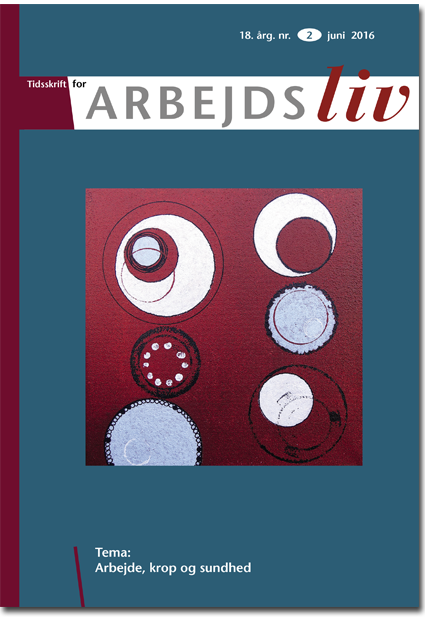The body in social pedagogical work
DOI:
https://doi.org/10.7146/tfa.v18i2.110865Abstract
This article is about bodywork as a central – but unrecognized – part of social pedagogical work. It focuses on the interactive processes and power dynamics con nected to caring for other people’s bodies, and how the professionals in accommoda tion facilities for people with intellectual disability (ID) handle the different chal lenges they face, when the daily tasks – such as bathing – are carried out in relation to the person with ID. The interactive aspects of caring for the body are particularly pertinent in relation to persons with severe ID, who depend on professional help for liv ing a daily life. Today, people with ID, who cannot care for their own needs on a daily basis, have a legislated right for receiving individual care with respect for their autonomy and integrity. At the same time, people with severe ID often have difficulties communicating their needs and agreeing to the care, the professionals think they need and have a responsibility for delivering. This makes the processes of doing bodywork particularly precarious and ambivalent. The empirical material consists of field notes generated while doing participant ob servation and interviews with staff in three accommodation facilities for people with ID. The theoretical framework is inspired by Scandinavian theories of carework (Wærness 1984, Szebehely 1996) and bodywork (Twigg 2000; Isaksen 2001; Wolkowitz 2002). The analysis shows that the professionals have to tackle different challenges connected to societal and professional norms for how to interact with other peoples’ bodies in vari ous ways. This type of body work involves direct bodily contact with both bodily waste and intimate parts of the body and at the same time, the professionals have to focus on and protect the dignity of the residents, who often have difficulties receiving help and expressing their needs verbally. A typical strategy applied by the professionals is to distance themselves from the ‘dirty’ as pects of their caring practices by focusing on the positive and social qualities of their relationship with the person with ID. Their ability to identify with the person and establish a good relationship, made it possible for them to gain personal and professional satisfaction from the job and endure the challenging aspects of dealing with another person’s bodily fluids and waste. The per formance of bodywork in relation to people with severe ID demands both large amounts of time, emotional resources and professional skill, and it is an important part of social pedagogical care, though it is often not recognized as such. Studying bodywork as a part of social pedagogical care can il luminate the delicate interactive processes and power relations that are involved with helping people in vulnerable positions, and it can contribute to a better understanding of the fact that humans live their lives as organic beings in mutual and relational de pendency of one another.
Downloads
Published
How to Cite
Issue
Section
License
Forfattere, der publicerer deres værker via dette tidsskrift, accepterer følgende vilkår:
- Forfattere bevarer deres ophavsret og giver tidsskriftet ret til første publicering, samtidigt med at værket ét år efter publiceringen er omfattet af en Creative Commons Attribution-licens, der giver andre ret til at dele værket med en anerkendelse af værkets forfatter og første publicering i nærværende tidsskrift.
- Forfattere kan indgå flere separate kontraktlige aftaler om ikke-eksklusiv distribution af tidsskriftets publicerede version af værket (f.eks. sende det til et institutionslager eller udgive det i en bog), med en anerkendelse af værkets første publicering i nærværende tidsskrift.
- Forfattere har ret til og opfordres til at publicere deres værker online (f.eks. i institutionslagre eller på deres websted) forud for og under manuskriptprocessen, da dette kan føre til produktive udvekslinger, samt tidligere og større citater fra publicerede værker (se The Effect of Open Access).





